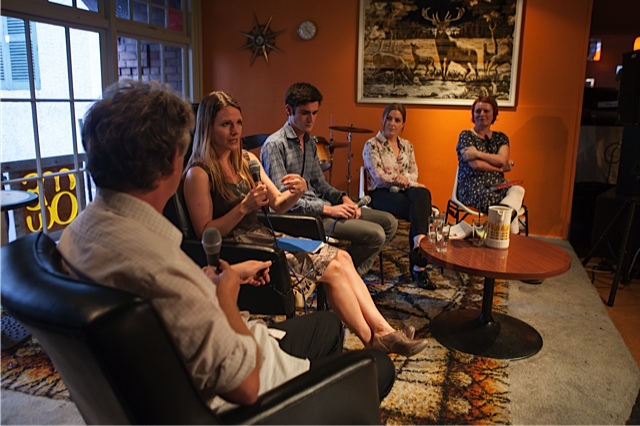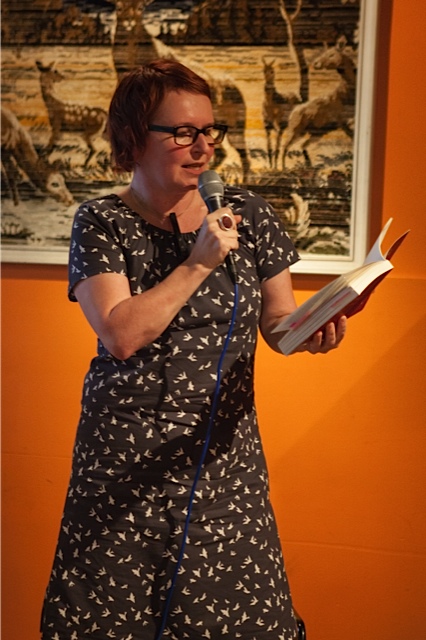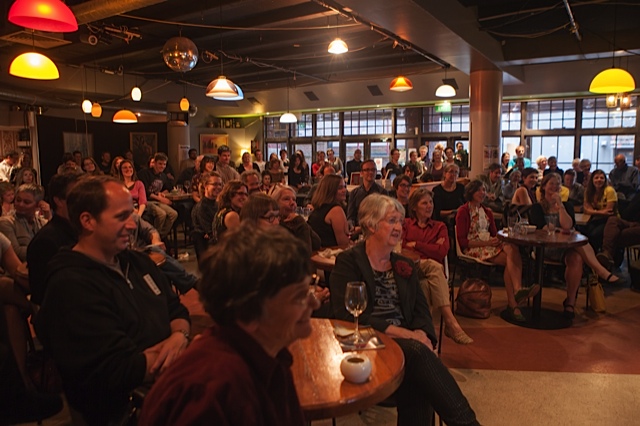Two writers festivals in two countries within three weeks, and I was a guest at both: heaven. Perth Writers Festival ran from 20 to 23 February — I’ve written about it here. After Perth, I was home in Wellington for just eight days before New Zealand Writers Week kicked off on 7 March. Writers Week ran from 7 to12 March, as part of the New Zealand Festival. The programme’s main venue is the lovely old (refurbished) Embassy Theatre. Whenever I could, I scurried down to my favoured audience pozzie: down the wind-y steps and into the third and last row of the orchestra pit.
My notes from Writers Week are patchy — sometimes, some sessions, I just got caught up in the talk of it, and listened rather than scratching in my notebook — and it’s getting on for a fortnight ago, now, so my memory’s fading. But I wanted to get down some thoughts on some of the standout sessions for me.
Saturday
The first of those was early in the festival, on Saturday afternoon. Midwives or Meddlers? saw Eleanor Catton and her UK editor, Max Porter, talking editing, and the relationship between editor and author. It really was a conversation — early in the session, they admitted that they weren’t sure who was chairing — and that was one of the things I particularly enjoyed about the session. My notes are all quotes from Porter, rather than Catton; I guess I was fascinated to hear the editor’s take on the process. Porter gave a shout-out to independent booksellers — notably, his own background was in bookselling before going into publishing — and talked of ‘the religion of the hand-sell’. He spoke too of the privilege of being independent as a publisher, and of the flexibility it gives. It (being an independent publisher) ‘let us be as fearless as you were’ he told Catton. He talked of ‘the rise and rise of the commercial imperative in publishing’ and described the current state of publishing as essentially marketeers and publicists against the champions of great books — among the most important of those champions being independent booksellers and publishers.
Sunday
Sunday saw some great sessions, but I was busy listening and watching, and my notes are sparse. In Reviewing the Reviewer, literary critic and memoirist Terry Castle — in conversation with Harry Ricketts — was funny, sharp and very engaging. ‘Novels give us information, in the same way gossip does,’ she told us, and ‘we need memoir — like we need gossip — to survive in society.’ She said — I didn’t note the context for this comment, and I don’t recall it now; damn! — ‘“Beauty” is my favourite word”; I have a recollection that she was talking about her response (and critical response) to art (to writing, to other art forms), and encouraging pure enjoyment of an artwork (as well as critical response? Instead of it?) as being a perfectly valid human response.
I wrote almost no notes during the excellent session with Alison Bechdel, Drawing from Life — guess I was busy enjoying it. I read too few graphic novels; Bechdel’s graphic memoir Are You My Mother?: A Comic Drama was, flat out, one of the best books I read during 2013. It’s about family and other relationships, therapy, Virginia Woolf, and storytelling. It works beautifully on (and subverts in places) the relationship (and tension) between text and images. The one note I made during Bechdel’s session touches on this, on text and image:
Words can be deceiving; appearances can be deceiving — if you triangulate between the two, you get an approximate truth.
Monday
I was so pleased to catch Jaspreet Singh’s session, Past Has Not Become Past Yet, on Monday morning, as I’d missed seeing Singh at Perth Writers Festival. I was interested, on one level, in elements of Singh’s writing life that chime with my own: Singh, like me, is a former research scientist; Singh moved to Canada in 1990 (I moved there in 1991, but moved on to New Zealand in 1996); and, he told us, he wrote his first short story at the age of 31 (I was in my early thirties when I wrote my first, er, publishable work). But these are trivialities; Singh was here to discuss his novel Helium, which deals with the anti-Sikh pogroms that took place in India in 1984, which Singh witnessed as a teenager in Delhi: ‘I saw ash particles floating in the air’. Writing the novel had not been therapeutic for him, he said; the events remain painful and real, and he is clearly passionately angry about continuing denial of those events, and the celebration and elevation of those who took part and even orchestrated them. Singh quoted Heinrich Heine: ‘Where they burn books, they will ultimately also burn people’; in India in 1984, he said, first they burned people, then they burned books. When he came to write Helium, he said, he had to ‘keep in mind the afterward-ness’ inherent in writing 30 years after the event.
Anne Kennedy’s session, Unravelling the National Grid, was a surprising delight. I’ve known of Kennedy for a long time, but never read her work — her novel The Last Days of the National Costume is now firmly on the to-read pile. Kennedy is a poet, writes fiction and screenplays, and co-edits online literary journal Trout. On working in different genres, she said ‘every project is a departure from the known’. Her novel, it was observed is funny; ‘humour — like grief, like depression — is raw,’ she said.
Eleanor Catton delivered the 2014 New Zealand Book Council Lecture on the Monday night. It was clever and entertaining. I took no notes, just let it flow over me. There were nanoparticles, the laws of thermodynamics, and a gentle (?) tearing down of “literary fiction” (with lots of air quotes). See David Larsen’s review in The Listener for more detail.
Actually, while I’m on the subject: stop reading this and just read David Larsen and Guy Somerset’s articles, reviews and round-ups of Writers Week in The Listener. They are fantastic, and I thank them.
Tuesday
Anne Kennedy chaired Jaspreet Singh and Kei Miller in The Real Make-Believe World on Tuesday morning, discussing the interplay between invention and fact in fiction, from Singh and Miller’s very different approaches. Miller said:
The present is multiple and complicated and simultaneous; how much more so for the past.
Miller rejected the idea that geographical distance (he is Jamaican-born, Scotland-based) gives greater or better perspective; ‘it just gives adifferent perspective’. Miller talked about the place of humour in writing: ‘laughter can be intelligent — it need not be trivial — it can provoke the same engagement’. Miller discussed how much of the art and craft of writing, in his case, was about hiding the research, and hiding the work that was behind the text. For Singh, writing Helium, the opposite was true: in Helium, the main character’s research is foregrounded, and is part of the structure, integral to the story.

Steve Braunias chaired Liam McIvanney (Dunedin-based Scottish academic and crime fiction writer) later on Tuesday, in a session I mostly just sat back and enjoyed. The first fiction that McIlvanney wrote, he told Braunias, was literary fiction, ‘vignettes, inert, literary’. ‘Did the characters do anything, go anywhere?’ Braunias asked. McIlvanney: ‘No. They stayed indoors, reminiscing in a Proustian fashion.’

Later that day — Tuesday evening — it was my turn to face Braunias, who chaired the First Published session, featuring me, Alice Miller, Caoilinn Hughes and Sebastian Hampson, all four of us local writers (by some definition of the word ‘local’!) with first books out recently (Hughes, Miller and Hampson’s books all launched during Writers Week; mine last September). The session, at Meow Cafe, was lots of fun, and Braunias was a generous, funny host. Having asked the question of each of us on stage, towards the end of the session he called on audience-member Fiona Kidman — ‘Never sit in the front row!’ she said — to talk about her memory of having her first book published. ‘I thought “My life will never be the same”; and it wasn’t,’ she said. Here’s hoping.
Wednesday

One of my favourite sessions of Writers Week was first up on Wednesday morning. Pacific Highways, the latest edition of Australian literary journal Griffith REVIEW, focuses on New Zealand, and editors Julianne Schultz and Lloyd Jones were joined by six of the contributing authors: Steve Braunias, Harry Ricketts, Bernard Beckett, Kate de Goldi, Ashleigh Young and Kate Camp. Lloyd Jones spoke about the ‘curious kind of cultural indifference’ between Australia and New Zealand, and the lack of awareness in Australia about the change that’s occurred in New Zealand society over the last decade or so. Schultz commented that Australian readers ‘didn’t have an access point’ for New Zealand writing. Steve Braunias expanded on this idea:
New Zealand literature is fantastically unwelcome in Australia. You can more easily buy a slave [in Australia] than a book of New Zealand literature.
Braunias, in his contribution to Pacific Highways (documenting his walk, one day, the thirty kilometres from his home to the Auckland airport), wanted to show ‘just how fabulously ordinary and dreary we are’, and ended by asking ‘Why on earth would you want to leave this place?’. Harry Ricketts talked about masks, reinvention, personal myths and the immigrant experience. Bernard Beckett, who wrote on New Zealand education for Pacific Highways, said that, in education, ‘we are obsessed with ranking — because it’s an easy number; but it’s an absurd number’; he observed that the problems facing education are problems ‘of the disposed, of poverty, of motivation, of identification’, and that ‘solutions that are simple will be wrong’. Kate de Goldi asked ‘where, within a country or a culture, do we find story?’. Ashleigh Young talked about shyness, about self-isolation, and considered ‘what isolation might give to a person that they can’t find outside’, and as a ‘protest against the stigma of the loner, the “rej”’. Kate Camp simply read a beautiful extract from ‘Whale Road’, her contribution to Pacific Highways.
It was a treat to sit in the audience and listen to Jordi Puntí, with whom I shared a session at Perth Writers Festival last month. Puntí’s novel, Lost Luggage, was written partly at the prompt of an authorial note to self: ‘Is it possible to write a novel about truck drivers?’. Clearly the answer is yes. As well as a writer, Puntí is a translator, and Lost Luggage is very much about language and translation. Puntí said:
[In Europe] one common language is English. The other common language is translation.
He talked about translation as ‘a creative but not an inventive process’, and ‘an apprenticeship for writing’.
Megan Dunn chaired The Portrait Writer, a session with biographer, curator and art collection manager Jill Trevelyan. It was a great session, a lovely conversation between the two women on stage. My notes are mainly quotes that Trevelyan offered up from the subjects of her biographies. From Peter McLeavey: ‘no arse-licking; just the best art in New Zealand’; ‘sometimes I feel like a vampire’ (on working with young artists); ‘there’s margin in mystery’ (on the value of art); ‘each exhibition is an artwork’. From Rita Angus: ‘I’m quietly regaining my virginity.’
The last session of Writers Week was the wonderful Elizabeth Knox in conversation with Steven Gale, in Letting the Ghosts In, focussing on Knox’s latest novel for adults, Wake, but touching on her 2013 YA novel, Mortal Fire, which she called ‘a book with darkness and radiance — a kind of loveliness in the way it works itself out’. Wake, she said, is ‘about madness — the dissolution of character’. ‘I believe in the heat of the moment when it comes to the drama in books,’ she said. And I think this was in response to questions about what she’s writing next, what’s to come:
I’m not even human if I’m not writing.
And there ended New Zealand Writers Week for 2014. Kathryn Carmody, Programme Manager, put together an outstanding programme, of which I was honoured and thrilled to be a part. Claire Mabey ran around like a mad thing — actually no, like a very controlled, organised thing — keeping it all together, running everything like clockwork. Congratulations and thanks to everyone who made it happen.

One thought on “New Zealand Writers Week round-up”
Comments are closed.